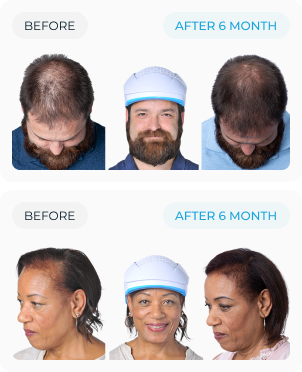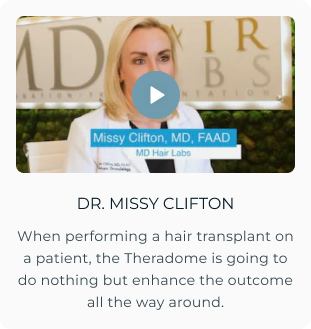Hair loss from scalp inflammation is more common than you think. Many people lose hair due to dandruff, psoriasis, and seborrheic dermatitis. These conditions cause scalp inflammation and irritation, leading to hair loss.
In this blog post, we will discuss the various causes of scalp-inflammatory hair loss. We will also discuss symptoms like redness, itching, and scaly patches. Understanding the causes can help you identify and treat the condition early.
Most types of hair loss caused by scalp inflammation are treatable. There are many effective treatments ranging from medicated shampoos to immunomodulators. You can stop hair fall and regrow new hair with proper care and early treatment. Having a healthy, inflammation-free scalp is key to maintaining a good head of hair.
What is Scalp Inflammation Hair Loss?
Scalp inflammation hair loss is when your scalp becomes irritated, swollen, and sometimes painful, leading to hair falling out. Scalp inflammation can happen because of various reasons, like skin conditions, allergies, or infections. When your scalp is inflamed, it can damage the hair follicles, which are the tiny pockets in your skin where hair grows.
The hair loss from scalp inflammation can look different for everyone. You might notice red, itchy patches on your scalp, flaking skin, or areas where hair is thinning or completely gone. The good news is that in many cases if you treat the inflammation, your hair can grow back.
A Look at Your Skin and Scalp
All mammals, including humans, have sebaceous glands on their skin. These secrete an oily type of viscous matter called sebum. Although this may not sound very appealing, sebum is essential for lubricating and waterproofing our skin.
The waterproofing bit is essential for our furry companions. We have the advantage of umbrellas to protect us from the rain after all. However, it still helps to understand this in the context of laser hair therapy.
Did you know that the Chinese were the first to coat parasols with wax to deter rain? Sebum works the same way. It works as a protective, waterproof coating on your skin. It is particularly plentiful in our faces and scalps.
Symptoms of Scalp Inflammation
Scalp inflammation occurs when the skin on the scalp becomes inflamed, leading to a range of symptoms.
If you're experiencing hair loss due to scalp inflammation, it's essential to recognize the signs and take appropriate measures to manage and treat the condition. Here are some of the most common symptoms of scalp inflammation:
Redness and Irritation
One of the most common symptoms of scalp inflammation is redness. The affected areas of the scalp may look reddish and feel irritated or itchy. This happens due to increased blood flow to inflamed areas.
Scaly patches
Scalp inflammation can cause scaly patches, which are areas of dry, flaky skin on the scalp.
You might notice white, yellow, or greyish flakes on your scalp or falling onto your shoulders. These patches can be itchy and sometimes feel tight or uncomfortable, making it harder to style your hair.
Hair loss
Chronic inflammation can damage hair follicles, leading to excessive shedding and thinning of hair. The hair loss is usually most noticeable at the frontal hairline and temples.
Tenderness
Tenderness is another sign of scalp inflammation. When your scalp is inflamed, it may feel sore or painful to touch.
You might notice discomfort when brushing your hair, washing your scalp, or resting your head on a pillow. The tenderness can range from mild sensitivity to more intense pain, and it often indicates that your scalp is irritated and needs gentle care.
Oily scalp
The oily scalp can indicate that your scalp might be inflamed.
When your scalp is inflamed, it might produce more oil than usual, making your hair look greasy even shortly after washing. The excess oil can trap dirt and dead skin cells, leading to further irritation.
Burning or soreness
A constant, irritating burning or soreness is often felt on affected areas of the scalp. This tends to worsen when the scalp is touched or scratched. If you experience burning or soreness, it’s important to consult with your physician to determine if any underlying conditions may be causing this issue.
5 Causes of Scalp Inflammation and Hair Loss
The term “scalp inflammation” is never really associated with a positive outcome. After all, who wants to be inflamed? So, let’s take a look at 5 causes of scalp inflammation and how that impacts hair loss.
1. Seborrheic Dermatitis
Seborrheic dermatitis is a common cause of scalp inflammation. Seborrheic dermatitis is a skin condition that causes red, itchy, and scaly patches on the scalp. It happens when the skin produces too much oil, leading to red, flaky patches on the scalp.
This condition can also cause scalp irritation and discomfort. The continuous irritation can damage hair follicles, causing hair to become weak and fall out more easily.
Also Read: Does Wearing a Hat Cause Seborrheic Dermatisis?
2. Psoriasis
Psoriasis is a skin problem that makes cells grow too fast, creating scaly, itchy, and sometimes red patches on the skin, including the scalp.
When psoriasis affects the scalp, it can inflate the skin, which can damage hair follicles and cause hair loss. That's why managing psoriasis with proper treatment can help reduce inflammation and hair loss.
3. Allergic Reactions
Allergic reactions can be another cause of scalp inflammation that results in hair loss. When someone has an allergy to certain hair products, foods, or environmental factors, their body may react by causing inflammation on the scalp. Inflammation can lead to itching, redness, and swelling.
If the allergic reaction is severe or long-lasting, it can damage hair follicles and disrupt normal hair growth. As a result, some people may experience temporary hair thinning or loss in the affected areas of their scalp.
4. Fungal Infections
One often overlooked source of scalp inflammation is fungal infections. These tiny organisms can reside on your scalp, leading to various uncomfortable symptoms. When fungi grow on the scalp, they can cause redness, itching, and flaking.
In some cases, the infection can become severe enough to damage hair follicles, resulting in patches of hair loss. Common fungal infections like ringworm of the scalp (tinea capitis) can be particularly troublesome, especially in children.
Additionally, overgrowth of yeast such as Malassezia furfur can cause dandruff and inflammation. And, if left untreated, this inflammation can contribute to further hair loss.
5. Folliculitis
Did you know that a condition called folliculitis can also lead to scalp inflammation and hair loss? This annoying problem occurs when hair follicles become infected or inflamed, often due to bacteria, fungi, or even irritation from shaving or tight hairstyles.
When folliculitis affects the scalp, it can cause small, red, and sometimes pus-filled bumps around the hair follicles. These inflamed spots can be itchy, sore, and may even form scabs. If the infection becomes severe or chronic, it can damage the hair follicles, leading to temporary or permanent hair loss in the affected areas.
Scalp Inflammation Hair Loss Treatment and Prevention
Various factors, such as dermatitis, psoriasis, fungal infections, and allergic reactions, cause inflammation. Here are some treatment options for scalp inflammation and hair loss to prevent and address the condition.
1. Maintain good hygiene
Wash your hair regularly with a gentle shampoo to keep your scalp clean and free from dirt and excess oil. Avoid using harsh shampoos or products that contain irritating chemicals.
2. Avoid triggers
Identify any potential triggers that might cause inflammation, such as hair products, hair dyes, toners, or styling chemicals. Avoid these triggers and switch to hypoallergenic or natural products.
3. Protect your scalp from the sun
Protecting your scalp is one of the best scalp inflammation hair loss treatment options since exposure to the sun can exacerbate inflammation. If you'll be spending time outdoors, wear a hat or use sunscreen specifically formulated for the scalp.
Read More: How Sunburn on the Scalp Can Cause Hair Loss?
4. Manage stress
You must practice stress-reducing techniques such as meditation, yoga, or regular exercise since chronic stress can contribute to inflammation.
5. Avoid scratching
Scratching the inflamed scalp can worsen the condition and lead to infection. If you have itchy scalp and feel the urge to scratch it often, apply a cold compress or use an anti-itch cream instead.
6. Use medicated shampoos
Depending upon the underlying cause of inflammation, you may use medicated shampoos containing ingredients like coal tar, salicylic acid, ketoconazole, or zinc pyrithione. Avoid shampoos with harmful ingredients like sulfates, parabens, and formaldehyde.
Learn More: Dry Shampoo vs Regular Shampoo
7. Consider dietary changes
Consider dietary changes as part of your scalp inflammation and hair loss treatment. A healthy diet of fruits, vegetables, and essential nutrients can support scalp health and reduce inflammation. Incorporating foods high in antioxidants, such as berries and leafy greens, can help combat inflammation.
8. Stay hydrated
Staying hydrated is an important part of treating scalp inflammation that can lead to hair loss. Drinking plenty of water and fluids like herbal tea helps to keep your scalp moisturized and prevents dryness and flakiness, which can contribute to inflammation. Keep a water bottle with you as a reminder to drink frequently throughout the day.
Diet To Treat Scalp Inflammation
Diet can play a significant role in managing inflammation in the body, albeit not excessive weight loss. Scalp inflammation can be caused by various factors, including skin conditions like psoriasis, seborrheic dermatitis, and eczema, as well as fungal infections and allergies. While dietary changes alone might not completely resolve these conditions, they can support overall skin health and potentially help alleviate some inflammation.
To treat scalp inflammation and hair loss, you should opt for an anti-inflammatory diet rich in fruits, vegetables, fatty fish, and whole grains, which can help reduce systemic inflammation. Also, go for omega-3 fatty acids, which are found in fatty fish, flaxseeds, chia seeds, and walnuts.
Avoid foods that can trigger inflammation or allergies. Also, reduce consumption of sugars and processed foods, which indirectly impact the skin.
What this Means for You
To summarize, any scalp inflammation, regardless of its causes, exacerbates female or male pattern hair loss and damages hair follicles. This is where using your laser hair growth caps/helmets comes in since laser hair therapy has been proven to decrease inflammation and restore each individual hair follicle for maximum hair regrowth.
To fight off and treat scalp inflammation and increase the efficiency of your laser hair loss treatment sessions, it is thus crucial to incorporate a shampoo regimen that addresses all inflammation and fungus issues properly when purchasing the Theradome PRO LH80.
Make the excellent decision to start at-home hair loss treatment sessions by investing in the Theradome. No more messy creams, no more visits to hair restoration clinics. Pressing the button of your laser hair growth helmet two to four times a week, depending on whether you use the Theradome PRO LH80 or EVO LH40 laser hair growth device, for 20 minutes is all you need to do for your laser hair therapy to work at its best.
Elevate your life with Theradome. Order your laser hair growth helmet and raise your hair game to new heights. Regain the thick, lush hair you've been longing for and boost your self-esteem along the way.

























